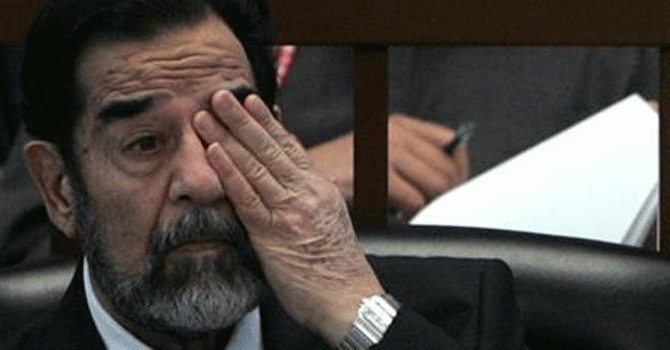Kurdish Girls ‘Sold’ To Egypt By Saddam Hussein After Anfal Genocide Campaign Reportedly Found

Dozens of young girls who were seized by Iraqi soldiers during Saddam Hussein’s brutal campaign against the Kurds in his country have been found in Egypt, according to reports in Kurdish media.
Rudaw, a Kurdish news service, reported that the girls had seen sold by Iraqi intelligence and security officials to the Egyptians to work as prostitutes, sex slaves or as dancers in nightclubs, following the horrific anti-Kurdish Anfal campaign of the late 1980s. The girls are now women in their 40s and 50s.
A Kurdish businessman named Rushdi Saeed said he has video evidence purporting to show some 40 Kurdish women now living in Egypt.
“Some of these women are now married and have children,” Saeed told Rudaw. “And some of them live in villages and live on handouts from people. In the video these women speak about their families. Some of them also speak about how many of their family members were killed in the campaign.”
Saeed has turned over his evidence to the Kurdistan Region’s Ministry of Anfal and Martyrs. However, it is unclear if the women depicted on the video match the names that the ministry keeps in its records of Kurdish women thought to have been kidnapped by Saddam’s men. In addition, even if the women in the video are truly Kurds, they might have moved to Egypt before or after the Anfal tragedy.
During the Anfal blood purge, Iraqi troops captured and murdered tens of thousands of Kurdish villagers in the deserts of Iraq in response to a Kurdish uprising in the final days of the Iraq-Iran war. Saddam used chemical weapons in his planned genocide of the Kurds as well as other minorities, including Assyrians, Yezidi and Turkmen.
Some 200,000 Kurds lost their lives in the campaign, while up to 5,000 Kurd villages were demolished. Most of the victims were buried in mass graves.
Women who were captured in this campaign reportedly suffered imprisonment and torture in Baghdad before their forced expulsion to Egypt.
“The women [in the video] say that they have worked in menial jobs in Egypt, but none of them says anything about working in nightclubs,” Aram Ahmad, the Kurdistan Region’s minister of Anfal and Martyrs, told Rudaw.
“Taking into account the women’s current circumstances and choice, as to whether they want to return to Kurdistan or not, we will try to solve this issue.”
EKurd.net reported that the Kurdistan Regional Government, which governs autonomous Kurdistan in northern Iraq, seeks to find the women in Egypt and determine their identity.
Nechirvan Barzani, the prime minister of the Kurdistan region, has formed a committee to establish the fate of the so-called “Anfal girls."
Previously, Kurdish authorities in northern Iraq had denied that the girls had even existed.
Bestoon Fayaq, a political activist who advocates for the families of the Anfal victims, told Kurdish media: “The Kurdish leadership lied to us. A few years ago... we asked Jalal Talabani, Iraqi president [a Kurd], to verify the authenticity of the news [that Kurdish women were sent to Egypt] and he assured us that he had contacted Egypt and that there was no such thing. Then we asked Adnan Mufti, former Kurdish Parliament chairman, [to investigate the news] and he answered the same way.”
An NGO called Kurdistan Without Genocide has urged the KRG to immediately cut diplomatic ties with Egypt should it be proven that the girls had been sold to Cairo.
© Copyright IBTimes 2024. All rights reserved.





















